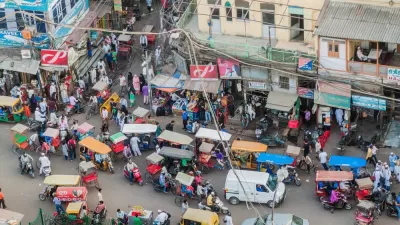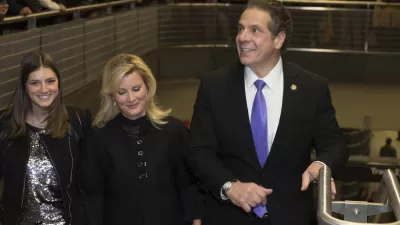Every year, Delhi produces 250,000 tons of plastic waste. Starting on November 23, the city government "will begin enforcing a ban on the manufacture, import, sale, storage and use of plastic bags, sheets, films or tubs," reports Raksha Kumar.
"The latest effort by Delhi would mark the first time a city in India is enforcing a blanket ban on plastic bags within its territory," writes Kumar. In 2009, the government tried to ban stores from giving out plastic bags to customers, but the effort "proved woefully ineffective and was roundly criticized by the industry." The old ban also exempted heavy-duty plastic bags under the assumption that they would be reused, but the new ban includes all varieties of plastic bags and will apply to manufacturers in Delhi as well. Under the Environment Protection Act of 1986, those who hand out plastic bags wil face a maximum penalty of 100,000 rupees and five years of imprisonment.
The enforcement of the ban will be a government-wide effort including the police department, food and sales division and labor inspectors, said Sandeep Mishra, additional secretary of the Delhi Department of Environment. The city government is also "planning to start an awareness campaign about the separation and recycling of waste, using social networking sites, and wil hand out a limited number of jute and cloth shopping bags to select Resident Welfare Assocations." However, sellers have expressed concern over losing customers, and plastic bag manufacturers have petitioned the High Court to block the ban. "Plastic bags are very convenient, " said Prashant Rajenkar, senior program coordinator at the nonprofit Toxics Link, "and unless there is an equally attractive alternative, people might not give it up completely."
FULL STORY: In Delhi, a Blanket Ban on Plastic Bags Starts This Week

Maui's Vacation Rental Debate Turns Ugly
Verbal attacks, misinformation campaigns and fistfights plague a high-stakes debate to convert thousands of vacation rentals into long-term housing.

Planetizen Federal Action Tracker
A weekly monitor of how Trump’s orders and actions are impacting planners and planning in America.

San Francisco Suspends Traffic Calming Amidst Record Deaths
Citing “a challenging fiscal landscape,” the city will cease the program on the heels of 42 traffic deaths, including 24 pedestrians.

Defunct Pittsburgh Power Plant to Become Residential Tower
A decommissioned steam heat plant will be redeveloped into almost 100 affordable housing units.

Trump Prompts Restructuring of Transportation Research Board in “Unprecedented Overreach”
The TRB has eliminated more than half of its committees including those focused on climate, equity, and cities.

Amtrak Rolls Out New Orleans to Alabama “Mardi Gras” Train
The new service will operate morning and evening departures between Mobile and New Orleans.
Urban Design for Planners 1: Software Tools
This six-course series explores essential urban design concepts using open source software and equips planners with the tools they need to participate fully in the urban design process.
Planning for Universal Design
Learn the tools for implementing Universal Design in planning regulations.
Heyer Gruel & Associates PA
JM Goldson LLC
Custer County Colorado
City of Camden Redevelopment Agency
City of Astoria
Transportation Research & Education Center (TREC) at Portland State University
Jefferson Parish Government
Camden Redevelopment Agency
City of Claremont





























